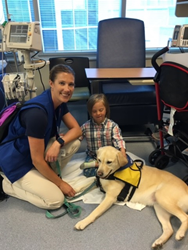HABRI-funded study finds dogs are not stressed when visiting pediatric cancer patients.
The Human Animal Bond Research Institute (HABRI) announced today the publication of a study exploring the impacts of therapy dog sessions on the welfare of the dogs involved. Conducted by researchers at American Humane, findings of the study demonstrate that dogs did not show increased stress resulting from the therapy visits. Funded by HABRI and Zoetis, American Humane’s newly-released “Canines and Childhood Cancer Study,” is one of the largest human-animal bond studies focusing on the impact of animal-assisted interaction (AAI) on children with cancer and their parents, as well as the participating therapy dogs.
 “Results of this study demonstrate that dogs did not show increased behavioral or physiological stress, indicating that placing therapy dogs in this type of therapeutic setting does not cause undue stress to the animals,” said Amy McCullough, PhD and Principal Investigator, American Humane. “This research will help American Humane, HABRI and practitioners in the field to maintain the highest standards of animal welfare.”
“Results of this study demonstrate that dogs did not show increased behavioral or physiological stress, indicating that placing therapy dogs in this type of therapeutic setting does not cause undue stress to the animals,” said Amy McCullough, PhD and Principal Investigator, American Humane. “This research will help American Humane, HABRI and practitioners in the field to maintain the highest standards of animal welfare.”
“This research project is important because now we have strong evidence that, with proper training and handling, the welfare of therapy animals in hospital settings is not adversely impacted,” said HABRI Executive Director Steven Feldman. “As more animals are deployed to help hospital patients, we can be confident that the dogs are OK!”
Dr. McCullough, along with Ashleigh Ruehrdanz, MPH and Molly Jenkins, MSW of American Humane, supervised data collection on participating handler-dog teams at five children’s hospitals across the United States. The objective of the study in regard to participating canines was to determine the stress levels of therapy dogs during regular AAI sessions with pediatric oncology patients and their families.
The research team videotaped each animal-assisted therapy session and coded the dogs’ behavior using an ethogram developed to capture affiliative and stress-related behaviors. The frequency of each behavior was coded from the videos and a score was determined for each. In total, more than 400 videos of the AAI sessions were coded. In addition, handlers completed the Canine Behavioral Assessment and Research Questionnaire (C-BARQ) upon entering the study, and completed a self-report measure regarding their dog’s behavior as well as AAI activities and participants after each session. The results showed that participating canines did not have significantly increased physiological or behavioral stress responses while participating in AAIs in pediatric oncology settings.
The researchers also measured canine stress through salivary cortisol levels, with a total of nearly 600 saliva samples collected and analyzed over the course of the study. Trained handlers obtained saliva samples from their dog using a swab. A series of five saliva samples taken at prescribed times (morning; noon; night; introduction of a trigger (therapy bandana or vest; upon arrival at the hospital) were averaged to produce a baseline cortisol level for each dog. Post-session saliva samples were taken 20-30 minutes after initiation of the AAI session. No significant differences in salivary cortisol levels between baseline and AAI sessions were found.
“In addition to these promising findings, it is important for therapy animal organizations, handlers and the health care facilities where they serve to meet high standards of care and welfare for the animals involved,” Feldman added.
Research Citation:
McCullough, Amy et.al., “Physiological and behavioral effects of animal-assisted interventions on therapy dogs in pediatric oncology settings”, Applied Animal Behaviour Science (2017), https://doi.org/10.1016/j.applanim.2017.11.014.
Source HABRI

